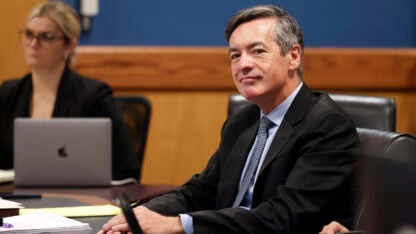WABE sent questions about environmental issues to all of the mayoral candidates. The questions cover climate change and extreme heat, water resources, park maintenance, the tree ordinance and lead contamination in West Atlanta neighborhoods.
The questions are in bold, and Andre Dickens‘ answers follow. Answers were edited for clarity.
Read answers from other candidates.
The U.S. Environmental Protection Agency recently expanded the area in English Avenue and Vine City where properties may need to have their soil completely removed and replaced, after finding dangerous levels of lead in people’s yards.
What role do you think the City of Atlanta should have in engaging with the community, and what is your plan to address this potential children’s health issue in West Atlanta neighborhoods?
The city should partner and work closely with the EPA to facilitate conversations and engage with the affected residents. The EPA will provide the testing and, if necessary, the replacement of the soil, but the city needs to ensure that there is proper communication and coordination with the residents. The City of Atlanta will need be an advocate for its residents to have this issue resolved in a timely and efficient manner.
While Atlanta has some big, beautiful new parks opening now and coming soon, many city parks need maintenance. According to the Park Department’s long-term planning program, Atlantans said the number one thing discouraging them from using their parks was that they were not well maintained.
How would you ensure that parks — whether they’re new or old, big or small, regardless of the neighborhood — get adequate funding and maintenance? And how would you involve communities in decisions about their parks?
It’s not enough to simply have a park within a half-mile of all residents, but we must have a quality park within a half-mile of all residents.
We first need to allocate our city funding in a more equitable manner. It cannot be that we have equal funding across our parks because some of our parks have strong conservancies to support them like Piedmont and Grant Park. We can prioritize our funding to the underserved communities and create a more equitable park system.
As mayor, I want to use the weight of the office to fully fund our parks and demand a more equitable allocation of our funds. Also, we need the leadership to attract and leverage outside sources of money including private funds available for our park system.
I also plan to research mechanisms for a revenue stream from our park system that can in turn be equitably distributed to the parks that need additional funding. An initial investment without long-term funding doesn’t help the next generation. I want to build a structure that lasts beyond my time in city government. We have to build and support structures and processes that persist into future generations.
As with all parts of our budget, it comes down to our priorities. The priority should not just be that everyone has access to a park. The priority should be to provide everyone access to a quality park. That’s going to require us to think differently about what an equitable distribution of money looks like.
Atlanta is losing its tree canopy, and the city has taken years to finish a promised re-write of the tree protection ordinance.
How would you make sure the ordinance update is completed, and ensure that it is enforced?
As a city councilman, I supported Atlanta City Council’s introduction of a new Tree Protection Ordinance (TPO). The goal of the proposed Tree Protection Ordinance is first and foremost to prioritize protection of the City of Atlanta’s tree canopy. The draft resolution specifically calls out the City of Atlanta’s tree canopy as a well-recognized integral part of the city’s identity, and the city is frequently described as the “City in the Forest.” I have supported the rewriting of this ordinance in conjunction with the Department of City Planning to support economic development while maintaining Atlanta’s tree canopy. Ensuring that this gets completed and enforced comes back to priorities. We have to prioritize the areas we need to change and provide the appropriate resources to see it is completed and enforced in an efficient manner.
Atlanta is hot and getting hotter. Often the hottest neighborhoods are in vulnerable communities of color. Atlanta also has many households with high energy burdens that pay a high proportion of their income to energy bills. Not everyone can afford to run the air conditioner all summer or afford efficiency upgrades to keep their homes cooler — and heat can be dangerous.
What role do you see for the mayor’s office in addressing the health risks of extreme heat?
The rising temperatures are a concern for all of us, but especially so in a more urban environment. The reduction of the tree canopy only enhances the urban heat island effect and the rising energy costs make it more expensive to keep our homes cool. The first effort from the City of Atlanta needs to be in the protection of our tree canopy, and that touches many of our policy efforts including affordable housing and transportation initiatives. We have to continue to discourage the emphasis on single-family zoning and push to develop more amenity-driven and transit-focused housing units. We have underdeveloped land currently available that will allow us to maintain the tree canopy that currently exists.
However, we must engage with the community to ensure we are not simultaneously displacing residents, pushing them further out of the city and then further worsening the environmental impacts of suburban sprawl. We need to support and retain existing affordable units by providing senior property tax freezes and no-cost renovations, which could also be used to ensure that our low-income residents have access to appropriate cooling in their homes.
Lastly, we need to work to reduce our dependency on automobiles and traditional roadways. Continuing to widen roads and push more cars on our roads does nothing to help our environment and results in worse conditions for stormwater runoff and infringes on our tree canopy. This is why I will work toward making Atlanta’s public transit free by 2030.
Addressing the rising temperatures and other environmental dangers requires a concerted effort across all policy areas.
To address climate change, the City of Atlanta prepared a climate action plan in 2015 on how to cut emissions. The city also made a commitment to achieve 100% clean energy by 2035. But progress towards that goal has been slow.
What, if anything, would you do to keep Atlanta moving towards emissions reductions? And how would you prepare Atlanta communities to weather the effects of climate change, which include extreme heat, increased flooding, mosquito-borne disease and worsening air quality?
I was proud of my vote to adopt the Clean Energy Atlanta plan. I’m well aware that it can ultimately drive job creation and workforce development opportunities, reduce energy bills and create healthier, more affordable homes while reducing greenhouse gas emissions. I am also aware that the administrations that oversaw the implementation of this policy haven’t done enough to bring that potential to fruition.
As mayor, I will work with the City Council to achieve our vision of 100% clean energy for 100% of Atlantans with equity in mind. I will work with the City Council and direct the Mayor’s Office of Resilience to ensure that our departmental capacity is staffed and funded at the level needed to advance the plan’s implementation at a pace that can meet our 2035 goals. That includes:
- Increasing deployment of energy efficiency and weatherization programs in our most overburdened neighborhoods.
- Supporting a Renters Energy Task Force and leveraging my leadership in affordable housing to explore ways to overcome split incentives that can be a barrier to energy efficiency in rental housing.
- Increasing deployment of clean energy by supporting solar bulk purchasing programs that include an LMI (low/moderate-income) component, such as Solarize Atlanta, while exploring a Community Solar Program through which payments for solar provided to the grid are credited to households with the highest energy burden.
- Collaborating with technical colleges, nonprofit partners and trade schools to develop a clean energy Workforce Training program to support job seekers without the resources to create economic mobility. I am prepared to share my expertise in technology job training and placement for our clean energy economy.
Georgia won a major legal victory in the water wars in the U.S. Supreme Court earlier this year, but there is still another case ongoing. And, Florida, Georgia and Alabama have not found a resolution between themselves. Metro Atlanta is subjected to both floods and droughts — both of which climate change will likely worsen — and we must share our limited water supply within the region and with downstream neighbors.
As the mayor of Atlanta, how would you see your role in addressing and preparing for the region’s water challenges?
As mayor of Atlanta, I will partner with and seek advice from a variety of experts on this issue including the EPA, the Chattahoochee Riverkeeper, the West Atlanta Watershed Alliance and other leaders in this area to research and implement innovative solutions to the water challenges. As with other challenges, it will take a team effort to ensure that the City is doing its part in solving this issue.
In the short term, I have proposed no-cost renovations for our senior populations as a way to avoid the displacement of our long-term residents and to retain affordable housing units. These renovations may extend to upgrading our water systems and appliances in those homes, including more efficient dishwashers, showerheads, faucets and toilets.
Read answers from other candidates.








